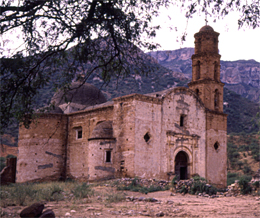 “In
Mexico formerly the big holiday of the entire year was Holy Week, Semana
Santa. Three days' holiday for all, and a whole week for those who were
more pious and, also financially able to go without work for that length
of time. It was a popular time for picnics, and the favorite place for
these was Satevo.
“In
Mexico formerly the big holiday of the entire year was Holy Week, Semana
Santa. Three days' holiday for all, and a whole week for those who were
more pious and, also financially able to go without work for that length
of time. It was a popular time for picnics, and the favorite place for
these was Satevo.“Satevo was a charming location where the gorge widened out, giving a broader space in the canyon between the river and the red and yellow porphyry bluffs that towered above Satevo for many hundred feet and practically enclosed this small spot on two sides. Here was the very old and very beautiful church built by the Roman Catholic Fathers more than two hundred years before.
“This gem of a church at Satevo with its arched dome, its two-bell tower—one of them is marked with dates proving them to have been cast in Spain before Columbus discovered Española, always inspired me, even as a young boy, with a feeling that never could be put into words.
“My first picnic at Satevo was in 1883. Even then the crypt beneath the High Altar had been broken into and the niches on either side, where the bodies of holy men had been entombed, were torn down and their remains strewn about the floor. This piece of desecration had been perpetrated by vandals who hoped to uncover gold or silver hidden there. The only treasure was the spring sunshine splintering its long arrows of gold on the arched dome.
“You will doubtless recall that when it was decided to expel certain orders for real or fancied wrongs, the plans for the expulsion were laid with greatest secrecy. There was to have been a concerted action on a stipulated day in all parts of Mexico, in order that the confiscation might be a thorough one, that they might secure all the treasure amassed by the orders for the benefit of the Federal Government.
“The Fathers were forewarned and they succeeded in gathering together a large quantity of their treasure and conveying it out of the country. Nevertheless, they were forced to bury huge amounts of gold and silver in various forms. This was done because although the men who were leading the confiscation failed in complete surprise, the information came to the Fathers not very long before the zero hour. That which was sent away had to go shipped through channels unknown to all but a trusted few, and it had to be carefully disguised. All this took time, and when the fatal day arrived there was still some treasure in Mexico belonging to the orders, some unmoved and some in transit on the trails. This had to be hastily buried or otherwise disposed of, and for many, many years it was the cause of interminable search and excavations.
“There is no doubt that many hiding places were found and rifled of their contents; but most of these discoveries were never publicly acknowledged.
“When I was a little boy I used to love to look at the shelves in the room on the right-hand side of the High Altar. This room had served as a library, upon them were still a few ancient tomes, one or two adorned by exquisitely executed illuminated work. When I returned there a few years later, all these parchment books had disappeared. They were of great historic interest, were written by hand in Latin, and contained records of the church at Satevo and its monastery.
“Unfortunately [the buildings] were partially destroyed at the time of the expulsion, and the rains during the decades that followed did the rest.
Click Here for information on our Copper Canyon Tours.


